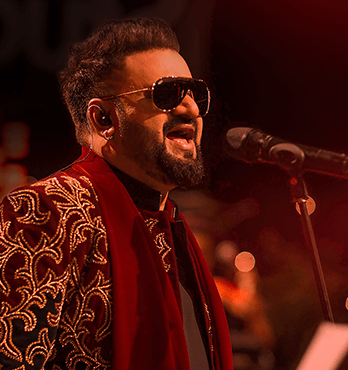Season 12 Blogs

Sahir Ali Bagga
by Ayesha binte Rashid
Sahir Ali Bagga’s career as a drummer began in 1989, when 8-year-old Bagga played on Madam Noor Jehan’s rendition of Mera Piya Ghar Aya for the film Bilawal. His father, Amjad Hussain, was playing percussions on the track and little Bagga had accompanied him to the studio. Once assembled, Madam Noor Jehan’s accompanying musicians found themselves without a drummer.
The film’s arranger, Riaz Sahab, suggested little Bagga as a replacement for the missing drummer, an idea met by mixed reactions. Bagga’s father worked off musical notation, a skill that Bagga had picked up — he was made to read through the notation as the drumkit was setup for him. Because his legs were too short to reach the kick pedal, its position had to be adjusted — even then, little Bagga had to strain to reach it. Riaz Sahab and Amjad stood with him as he played, the other musicians at a safe distance, not wanting to crowd the young child and overwhelm him. Bagga demonstrated what he could do, his father instructing and correcting him, and to the general satisfaction of the gathered company, managed to learn his parts.
To preserve little Bagga’s energy, he was told to skip the rehearsals, a suggestion he met with considerable protest. Little Bagga was excited, ready to show these adults what he could do, and didn’t want to be left out. He was told he could join in by lightly beating the drums with his hands. While the adults rehearsed, Bagga sat at the drum kit, watching and waiting, contenting himself with what little he was allowed to do.
By the time Madam Noor Jehan stepped into the studio, little Bagga was fired up and ready to be let loose. She may not have been used to seeing a child in her recording sessions, but she took it in her stride. The song began and Bagga gave it all he got, eyes glued to the musical notes in front of him, only moving to look up at his father from time to time. The take got him a round of applause from his seniors. Noor Jehan hugged him, told him to buy himself musical toys, and Bagga went on to play on the final take of the song. As Anjuman Shaheen dances to the song in Bilawal, lip-syncing to Madam Noor Jehan’s voice, little Bagga can be heard playing his drums, his legs straining to reach the kick pedal.
Bagga had already discarded toy cars for musical instruments by the time he played on Noor Jehan’s track. At home, he’d always be found playing with his father’s percussion instruments – woodblocks, tablas, congos. In a YouTube video, Bagga’s father tells the story of 7-year-old Bagga helping him set up his first electronic drumkit. Even when he got into trouble, it was because of musical instruments — he remembers breaking the window of a locked room to get to the drumkit. Mostly, Bagga was just curious. He would listen for sounds in songs and his 7-year-old mind would go home and try to recreate them with what he could find.
“In our family, you would be pulled into music if you showed a talent for it,” Bagga explains. He spent his childhood in the hallways and rooms of the Tafu Gharana’s haveli in Lahore’s Bhati Gate, surrounded by cousins and uncles. Taken in as an apprentice amongst this household of ustads , he was playing for musical giants such as Ghulam Ali, Lata Mangeshkar and Mehdi Hassan Khan – at whose half-joking behest Bagga cut off his long hair – during his teenage years.
Childlike curiosity turned into imagination and Bagga found himself exploring other musical avenues, hungry for creative outlets that allowed for innovation. Bands like Jupiter came along and Bagga started collaborating with artists like Jawad Ahmed, who convinced Bagga to try his hand at composing. All that he had been learning and storing in his musical mind since he was that eight-year-old, waiting to be let loose, made Bagga a versatile producer. For the over 5000 songs that he’s produced, Bagga would sometimes sing guide vocals in the demo tracks. They’d be meant to guide the vocalist on their parts, but music directors began asking Bagga to sing. With that same curiosity, Bagga threw himself into a career as a performer, building a versatile repertoire as a vocalist.
Through his career, Bagga has been guided by his imagination and his desire for experimentation, reaching into the musical storage inside his mind, finding ways to reimagine what he has seen and learnt. His music is rooted firmly in the colors of the Subcontinent and when he talks about innovation, it is with a repeated emphasis on doing so with local instruments, musical scales and rhythms. “I always, always want to do music that is ours, that comes from our soil,” he says conclusively, “because our culture, our music, is unparalleled in the world.”
